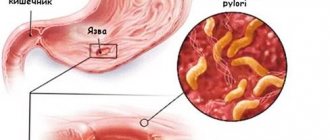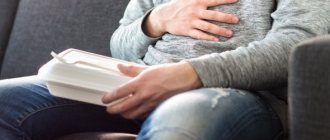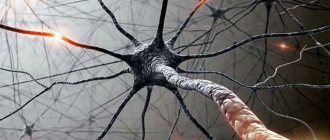Most of us have such discomfort as hunger pain in the stomach, we often ignore it. It’s clear why, because after eating something tasty, a sandwich or a cookie, the unpleasant and obsessive feeling is drowned out.
However, hunger pain is a symptom that signals that you are developing or already progressing a disease of the gastrointestinal tract (gastritis, duodenal and stomach ulcers).
Hunger pains and their signs
Hunger pains can be very intense
Hunger pain is called a pre-ulcerative condition, which manifests itself in the presence of advanced inflammation of the stomach or in the presence of erosive duodenitis (intestinal disease).
Painful sensations occur in the pit of the stomach or slightly lower, the pain intensifies when pressing with your fingers.
Additional symptoms of a peptic ulcer: nausea, sour vomiting that occurs at the peak of pain, heartburn and even constipation. A fairly common reaction to hunger pain is loss of appetite. This is usually a psychological problem; the body rejects food because it is too heavy for it.
Symptoms of pathology
If you have persistent abdominal pain, you should consult a doctor.
Abdominal pain is not an independent disease. This is a symptom that accompanies a certain pathological process.
It, in turn, may be accompanied by additional signs. If a patient has episodic pain in the abdominal area for a month, which is not accompanied by additional symptoms, then he can eliminate them independently using a variety of antispasmodic medications.
If episodic pain occurs over a longer period and is accompanied by additional symptoms, then the person needs to seek help from a doctor.
Quite often, when pathology appears, an increase in body temperature is observed, which indicates the development of an inflammatory process. Some patients complain of dark urine or light, pasty stools. Quite common symptoms of the pathology are nausea and vomiting. Representatives of the fairer sex may simultaneously experience vaginal bleeding.
Hunger pains, what to do?
The first thing that needs to be done is to analyze the pain, make an appointment with a gastroenterologist, undergo diagnostics, and possibly even a second one. After which the doctor will make a decision - hospitalization.
You can analyze pain sensations as follows: with a stomach ulcer, pain appears approximately half an hour after eating; for duodenal ulcer - after a few hours. These symptoms may appear at night.
If you are experiencing hunger pangs, you must control your diet. Eliminate spicy, fatty and fried foods from your daily diet. Replace a sandwich snack with hot food: soups, cereals. Fish and meat are boiled or steamed. If you have hunger pains, you should give up all kinds of weight loss diets.
Why does the disease occur?
When we talk about the common causes of intestinal and stomach diseases, they are often caused by bacteria, hereditary predisposition, and acquired chronic pathologies.
But do not forget that the vagus nerve is involved in organizing proper gastric secretion. When it is at rest, secretion occurs normally and the person feels comfortable. But psychological shocks and past illnesses, as well as simply constant anxiety, can lead to serious problems.
Among the common causes of gastric neurosis are:
- Problems of a psychological nature. They arise when a person feels constant anxiety, is dissatisfied with himself, or experiences a tragic event. Psychologists note that neurosis can cause a break with a loved one, being in a negative environment in a team at work, or the loss of a relative.
- Wrong lifestyle. The nervous system suffers due to lack of sleep, poor work-rest balance, and constant severe stress.
- Nutrition problems. The gastrointestinal tract makes itself known when you eat a lot of fatty, heavy foods, consume a lot of sweets and starchy foods. Poor diet is another risk factor. To avoid getting sick, you should give up frequent snacking and balance your diet.
- Past illnesses. Many viral diseases, as well as problems with the stomach and intestines, quickly provoke neurosis. The problem appears against the background of gastritis, neoplasms, ulcers and other problems.
- Negative effects on the gastrointestinal tract. The disease can manifest itself after severe poisoning, as well as during intoxication, against the background of bad habits.
Hunger pains - treatment
Treatment of hunger pain is based on preventing the development of the above pathologies. Therefore, treatment is based on the following:
- normalization of motility of the entire gastrointestinal tract, for this purpose Metoclopramide or Cerucal is prescribed;
- prescription of painkillers, analogues of Analgin;
- in order to reduce the secretion of hydrochloric acid, gastrologists prescribe antisecretory drugs, for example, Lansoprazole, Pantoprazole, Omeprazole and other proton pump blockers;
- prescribing antispasmodics that eliminate local muscle spasms.
In addition to the above urgent complex treatment, it is necessary to carry out basic pathogenetic treatment. It involves taking antibacterial drugs. Helicobacter, which plays the role of a microbial agent in the development of peptic ulcers, is sensitive to these drugs.
Etiology of stomach spasm
The causes of gastric cramps can be both underlying diseases, such as gastritis, duodenitis, peptic ulcer, and the consequences of various complications after infectious diseases, or in the presence of concomitant processes. For example:
- Solarite causes a burning sensation in the stomach;
- a decrease in the secretory activity of the stomach causes heaviness in it;
- Pyloric stenosis is characterized by a feeling of fullness in the stomach.
As a rule, stomach pain is associated with a whole complex of concomitant diseases - colitis, pancreatitis, cholecystitis.
Hungry pain in the stomach at night
Hunger pain in the stomach at night in 90% of cases indicates the topography of a peptic ulcer, which is usually located in the duodenum or in the antrum of the stomach. To confirm the diagnosis, fibrogastroduodenoscopy is prescribed. During diagnosis, the ulcerative defect and its degree of development can be seen in all its glory. In most cases, during fibrogastroduodenoscopy, a biopsy is taken in order to exclude an oncological process.
Acute gastritis - symptoms and treatment
Diagnosis begins with interviewing and examining the patient. During the conversation, the gastroenterologist clarifies what the patient ate before the signs of acute gastritis appeared, what medications he is taking, and whether he has any concomitant diseases (neuralgia, gallbladder, liver or heart disease). Objectively, attention is drawn to pale and dry skin, coating on the tongue, rashes in the area of the nasolabial triangle, bitterness and bad breath. On palpation (palpation), pain occurs in the epigastrium with irradiation to the left or right hypochondrium.
To confirm the diagnosis, various laboratory and instrumental research methods are used.
Important laboratory tests include:
- clinical blood test;
- 13C-urease breath test for antigen to Helicobacter pylori;
- biochemical blood test - allows you to identify disturbances in the functioning of the pancreas, liver, gallbladder and its ducts.
most commonly used instrumental diagnostic methods are
- radiography with a contrast agent - allows you to examine the relief of the gastric mucosa and the degree of tension of its walls;
- Ultrasound of the stomach - makes it possible to study the affected areas during a detailed examination, but does not allow collecting material for a detailed laboratory study.
FGDS deserves special attention - insertion of a thin endoscope into the stomach through the esophagus. This procedure is the optimal diagnostic method for gastric diseases [12]. It is prescribed regardless of the patient’s age. It allows you to determine the areas and extent of damage to the mucosa, assess the risk of internal bleeding and timely detect a malignant neoplasm.
The advantage of FGDS is the ability to perform a biopsy - to pinch off a small piece of tissue from different parts of the stomach. This procedure is painless and cannot cause bleeding.
The rules for preparing for FGDS are quite simple:
- a few days before the procedure, you need to give up some medications or coordinate their use with your doctor;
- 12 hours before the examination, refuse to eat (if the procedure is scheduled for the morning, then the last meal can be at 18:00, but not later).
Often patients are emotionally frightened due to the upcoming FGDS. The procedure is unpleasant, but tolerable and practically painless. As a rule, 15 minutes are allotted for it, but in the absence of pathologies, the process takes no more than 2-5 minutes.
FGDS can take place under:
- general anesthesia;
- light sedation (pain relief);
- local anesthesia.
Most often, doctors use local anesthesia - irrigation of the mucous membrane of the pharynx and the root of the tongue with a special anesthetic drug. This is a reliable method, proven over the years, which does not cause any complications and is easily tolerated by patients of any age. It allows you to reduce the gag reflex and calm the patient, without causing complications. Within 10-15 minutes the patient feels the same as before.
Anesthesia (medicated sleep) is carried out in the absence of contraindications, is easily tolerated, makes it possible to avoid negative emotions from the procedure, and also allows the endoscopist to work calmly and efficiently. Medication-induced sleep is performed in many countries around the world on a regular basis during a standard endoscopic procedure (sleep endoscopy). Local anesthesia is often an exception to the rule and is performed in the presence of contraindications to intravenous sedation, of which there are very few.
Complications after FGDS are rare. These include: dry or sore mouth, headache due to the patient’s severe nervousness. When the walls of the stomach are straightened during the procedure, belching of air may occur.
to become infected during FGDS if the equipment is processed and sterilized not manually, but in automatic installations for washing endoscopes.
Hungry stomach pain in the morning
Pain increases with palpation
Painful sensations that occur in the morning, usually from 3 to 5, indicate an erosive-ulcerative lesion localized in the duodenum. To reduce pain, just drink milk or water. The pain may subside after vomiting.
This is explained by the fact that during vomiting the acidity of gastric juice decreases, which irritates sensitive nerve roots. In this case, morning hunger pains indicate the presence of a peptic ulcer, which means that a person needs correct diagnosis and appropriate treatment.
Popular questions and answers
Stomach pain after eating is a sign of many diseases. However, many ignore unpleasant symptoms or limit themselves to taking medications without consulting a doctor. We asked experts how dangerous stomach pain can be, when you need to see a doctor, and what remedies can help relieve the condition at home.
When can stomach pain after eating be dangerous?
Stomach pain that occurs against the background of acute cholecystitis, acute pancreatitis, ulcerative bleeding or ulcer perforation is considered dangerous. These conditions require emergency medical attention, including surgery.
When to see a doctor if you have stomach pain after eating?
Always, if attacks recur more or less regularly. Urgent help is required if the pain does not go away within several hours or intensifies, accompanied by nausea, vomiting, and fever.
How can you relieve stomach pain after eating?
If the pain is caused by increased acidity of the gastric juice, an antacid drug or a regular soda solution can help - 1 teaspoon of soda per glass of water. Antispasmodics and proton pump inhibitors can be used to relieve pain. If the condition has not improved after 2-3 hours, you should urgently seek medical help. Painkillers (analgesics) should not be used, as they distort the symptoms and prevent an accurate diagnosis.
Is it possible to get rid of stomach pain after eating using folk remedies?
Sometimes you can. For this purpose, decoctions and infusions of medicinal plants are suitable, which have an antispasmodic and calming effect. You can prepare and drink an infusion of chamomile, mint or ginger.
Sources
- Chronic gastritis: clinical options and treatment. S. S. Vyalov. Federal State Autonomous Educational Institution of Higher Education Peoples' Friendship University of Russia. https://www.consilium.orscience.ru/upload/iblock/9c0/ 9c09f83310f095a96843efacae2d3fa7.pdf
- National recommendations for the diagnosis and treatment of acid-dependent and HELICOBACTER PYLORI-associated diseases. Russian Scientific Society of Therapists. Scientific Society of Gastroenterologists of Russia.
- Clinical recommendations. Peptic ulcer disease. Russian Gastroenterological Association. Russian Endoscopic Society.
- Recommendations of the Russian Gastroenterological Association for the diagnosis and treatment of cholelithiasis.








